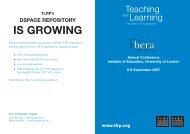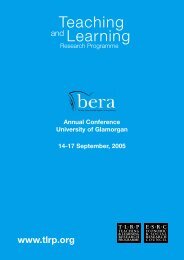Assessment in schools Fit for purpose? - Teaching and Learning ...
Assessment in schools Fit for purpose? - Teaching and Learning ...
Assessment in schools Fit for purpose? - Teaching and Learning ...
Create successful ePaper yourself
Turn your PDF publications into a flip-book with our unique Google optimized e-Paper software.
<strong>Assessment</strong> <strong>in</strong> <strong>schools</strong>. <strong>Fit</strong> <strong>for</strong> <strong>purpose</strong>?<br />
Rout<strong>in</strong>e <strong>in</strong>-class assessment does not always require the creation of specific tasks or tests. In many<br />
cases, it will be appropriate <strong>for</strong> teachers simply to record their judgments of pupils’ progress dur<strong>in</strong>g dayto-day<br />
classroom work <strong>and</strong> review these at appropriate <strong>in</strong>tervals to come to a summ<strong>in</strong>g-up judgment.<br />
This applies particularly <strong>in</strong> primary <strong>schools</strong> where class teachers have more opportunity than subject<br />
teachers <strong>in</strong> secondary <strong>schools</strong> to amass a wealth of <strong>in</strong><strong>for</strong>mation about each pupil’s achievements.<br />
On reliability, there is less of a need <strong>for</strong> an assessment to be reliable if it is meant, primarily, to be used<br />
with<strong>in</strong> a class, or with<strong>in</strong> a school. There is no need to put <strong>in</strong> place moderation procedures <strong>for</strong> rout<strong>in</strong>e<br />
<strong>in</strong>-class summative assessments when their ma<strong>in</strong> <strong>purpose</strong> is to provide a plat<strong>for</strong>m <strong>for</strong> further learn<strong>in</strong>g.<br />
They are only necessary when the data from assessments are to be used externally.<br />
Quality <strong>in</strong> summative assessment by teachers requires a high level of skill on the part of the teacher. At<br />
the same time, teachers need to ensure that their <strong>for</strong>mative assessment practices are not distorted by<br />
the dem<strong>and</strong>s of summative assessment. This is a challeng<strong>in</strong>g agenda.<br />
Summative assessment by teachers <strong>for</strong> external <strong>purpose</strong>s<br />
Quality summative assessment beyond the school is important, <strong>for</strong> example, when a pupil moves from<br />
one school to another; when the judgments made by a pupil’s own teacher contribute towards an<br />
external qualification; <strong>and</strong> when summative assessment by teachers <strong>for</strong>ms part of a wider system of<br />
assessment at local, regional or national level.<br />
In such contexts, the credibility of the judgments made by teachers will need to be manifestly consistent<br />
<strong>and</strong> unbiased. Systems will be needed to ensure that all teachers engaged <strong>in</strong> mak<strong>in</strong>g judgments <strong>in</strong> a<br />
particular context are work<strong>in</strong>g <strong>in</strong> comparable ways to an agreed set of criteria <strong>and</strong> st<strong>and</strong>ards.<br />
For any context <strong>in</strong> which a much larger number of teachers are mak<strong>in</strong>g judgments <strong>in</strong>dependently of<br />
each other, a more sophisticated <strong>in</strong>frastructure of guidance, tra<strong>in</strong><strong>in</strong>g, support <strong>and</strong> cross-check<strong>in</strong>g is<br />
required if the quality of those judgments is to be assured.<br />
For all assessment, pupils, parents <strong>and</strong> teachers need assurance that the results <strong>for</strong> a particular pupil<br />
are comparable across different teachers <strong>in</strong> a school <strong>and</strong> between <strong>schools</strong>. Few <strong>schools</strong> are able, by<br />
themselves, to audit <strong>in</strong>ter-school comparability, but they should have procedures <strong>in</strong> place to check <strong>in</strong>traschool<br />
comparability, to be followed up by <strong>in</strong>ter-school moderation. In secondary <strong>schools</strong>, all subject<br />
departments should have a clear <strong>and</strong> documented assessment policy <strong>in</strong>clud<strong>in</strong>g specifications <strong>for</strong> the<br />
assessment <strong>in</strong>struments to be used, <strong>for</strong> ensur<strong>in</strong>g validity, <strong>for</strong> resolv<strong>in</strong>g differences of op<strong>in</strong>ion between<br />
teachers, <strong>and</strong> <strong>for</strong> procedures to be used to check the assignment of levels or grades. In primary<br />
<strong>schools</strong>, there should be an agreed assessment policy that provides <strong>for</strong> teachers to have time <strong>for</strong><br />
review<strong>in</strong>g each pupil’s work <strong>and</strong> discuss<strong>in</strong>g the evidence used <strong>in</strong> assess<strong>in</strong>g it.<br />
The reliability of results becomes more important when assessment data are <strong>in</strong>tended to be used<br />
outside of a school to help <strong>for</strong>m judgments on that <strong>in</strong>stitution, its teachers, a local authority, a nation<br />
or region, or public judgments on the levels of atta<strong>in</strong>ment of the pupils. Summative assessment by<br />
teachers can <strong>and</strong> does have a role, around the world, <strong>in</strong> large-scale systems of assessment. However,<br />
there can be a conflict when teacher judgment is used to summarise pupil per<strong>for</strong>mance, <strong>and</strong> when<br />
the per<strong>for</strong>mance data are then used <strong>for</strong> accountability <strong>purpose</strong>s. This was highlighted <strong>in</strong> a review of<br />
large-scale assessment systems <strong>in</strong> seven countries: “...While many systems rely on teacher judgment<br />
<strong>for</strong> assessments that are high stakes <strong>for</strong> students, there are...no systems that rely on teacher judgment<br />
<strong>for</strong> assessments that are high stakes <strong>for</strong> teachers” 8 . This needs to be borne <strong>in</strong> m<strong>in</strong>d if one is seek<strong>in</strong>g to<br />
construct systems of public accountability that are based on teacher assessment.<br />
8 Black P & Wiliam D (2007): Large-scale <strong>Assessment</strong> Systems: Design pr<strong>in</strong>ciples drawn from <strong>in</strong>ternational<br />
comparisons. Measurement, 5 (1): 1-53.<br />
15

















